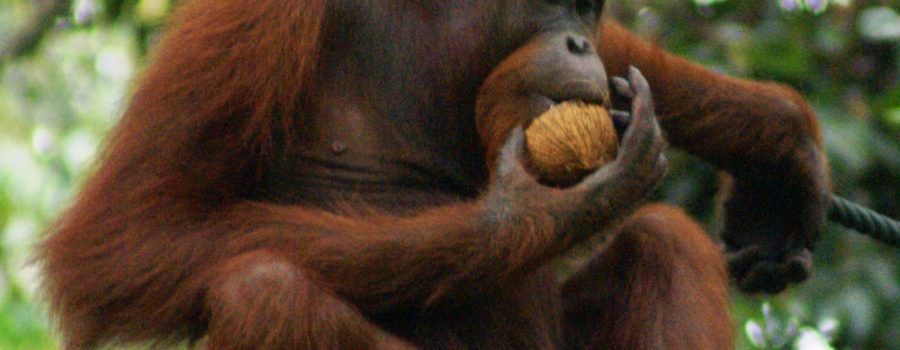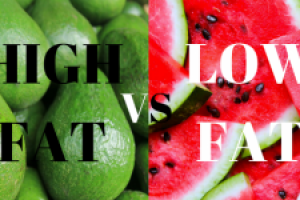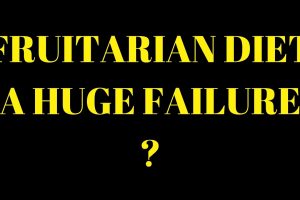Do you want to know what is a frugivore? You came to the right place. Here you will find the best frugivore definition, along with a detailed explanation of the frugivore diet and the answer everyone wants to know: Are humans frugivores? I will give you a clue, we certainly have frugivore teeth 😉
What is a Frugivore? Pick your Definition
Many dictionaries have included the frugivore definition in their texts. If you want to find out what is a frugivore, you just need to look at any of these dictionaries online and you will find very similar definitions.
For example, the frugivore definition from dictionary.com says that a frugivore is “any chiefly fruit-eating organism”, and what does chiefly mean? It means that the frugivore diet consists mostly on fruit. When we look at the oxford dictionary, we find a slightly different frugivore definition. According to them a frugivore is simply “an animal that feeds on fruit”. This means that a frugivore diet does not need to consist of mainly fruit, it simply means that for an animal to be considered a frugivore, it just needs to feed on fruit. Wikipedia’s frugivore definition is a bit more complex and somewhat strange, stating that “a frugivore is a fruit eater” and that “a frugivore can be any type of herbivore or omnivore where fruit is a preferred food type”. That means that herbivores and an omnivores can simultaneously be frugivores. This is somewhat strange since it would seem that the frugivore definition is mutually exclusive from the herbivore and omnivore definitions.
As you can see, understanding what is a frugivore is not so simple because many dictionaries and “experts” propose different definitions. The Encyclopedia Britannica also has its own definition, according tho their text “a frugivore is any animal that subsists totally or primarily on fruit”. Some examples of this would include the several species of bats, such as the Jamaican fruit bat (Artibeus jamaicensis) and a number of flying foxes (Pteropus), many passerine birds, and some fish of family Characidae. One primate group that is essentially frugivore are the Owl Monkeys (wikipedia).
Deciding What is a Frugivore
When we consider all the frugivore definitions we just provided, it is obvious that there is no clear cut answer to the question of what is a frugivore. It is clear that a frugivore feeds on fruit and in some cases, a frugivore feeds mainly on fruit, or has a frugivore diet that consists on nothing but fruit. This may be sufficient to get a general idea of what is a frugivore, but it doesn’t allow us to have a clear differentiation between animals that eat fruit once in a while and those that eat nothing but fruit.
This is especially problematic when it comes to finding out if humans are frugivores. In one hand, we can say that humans are frugivores because they feed on fruit. There is no denying that since we can see that billions of humans do in fact feed on fruit. We can also see that fruit is part of the human/frugivore diet because most countries include fruit in their food pyramid and most sane nutritionist recommend their clients to eat, at least, one piece of fruit. However, there are several human cultures that do not eat any fruit at all. For example, there are Eskimo tribes, and groups of people living in the Himalayas, who never eat any fruit at all. Does that mean that they are not humans or does it mean that they simply are not frugivores?
Well of course no one could say that Eskimos and people living in the Himalayas are not humans, that would be ridiculous. So how can we then decide if humans are frugivores when we have some cultures eating no fruit at all, and other cultures, like those living in the tropics, surviving on a diet that is mostly a frugivore diet? As you can see, understanding what is a frugivore is not as simple as it seems.
“Expert’s” Definition of What is a Frugivore
To add confusion to the topic, we have several people who through out their own frugivore definition. Sometimes they simply copy what others say, and other times they make up their own frugivore definition, according to their preferences. For example, many raw foodists will say that humans are frugivores and they will through that as a matter of fact. Of course they have their reasons to back these claims. Those who believe in the THEORY of evolution claim that “We evolved from the same genetic line that spawned our closest relatives, the bonobos and chimpanzees, who feast on fruit and greens in the forests of equatorial Africa.”
There are also those who enjoy the science of anatomy, point out that when we compare our digestive anatomy to that of bonobos and chimps (who are considered frugivores), we see that there are minor differences, concluding that we are primed to get our calories from fruit, while still consuming a fairly large amount of vegetables. At the same time, humans are capable of digesting, to some degree, things like hamburgers, milkshakes, and sweet potatoes. Does this contradict the idea that humans are frugivores or is this just a cultural adaptation that has nothing to do with out anatomy?
Those who have done serious in depth research to find out what is a frugivore, and weather or not humans are frugivore, can explain the many layers that need to be taken in consideration. One expert explains that “The foods and influences to which a species is biologically adapted are those deemed “natural” to its disposition as derived by the sum total of their biological heritage from millions of years of evolution. Cumulative adaptations in each species over eons of time determines their natural dietary needs.”. In other words, it doesn’t matter if humans eat burgers and milkshakes, if humans have been eating mostly fruit for millions of years, and if our anatomy reveals frugivorous traits, then we must conclude that humans are frugivores. If research shows that humans have been feeding mostly on raw fruits, succulent fruit-like vegetables, roots, shoots, nuts and seeds, then we must conclude that humans are frugivores, along with apes, gorillas, chimpanzees, monkeys and orangutans.
So, Are Humans Frugivores?
An expert explains that “Tradition and popularity are the poorest ways to determine a proper diet. Recent changes in our external environment do not alter our biological adaptations, our internal makeup, or our natural needs in order to establish optimum well being. Biological adaptations have been spurred on by stress over eons of time and by the need to adapt. They are slow to develop requiring extremely long periods of time to evolve. Our highly industrialized environment involves more social adaptations or accommodations, and not physical or anatomical changes. By living according to our natural adaptations we can actually withstand the stress of modern life far better than if we transgress our biological needs.” In other words, when it comes to determining what foods are best for us, the only authority we should rely on is the human body.
Many people want to know if humans are frugivores. They want to know what is our most natural food. If we were true carnivores, we would secure our nutrients from raw flesh, blood and bones just like tigers and wolves. If we true herbivores we would thrive on lettuce, grasses, raw grains and celery just like horses, cows and sheep. If we were granivores, we would feed on mostly raw seeds and grains, just like birds, and if humans are frugivores, we should thrive on a diet of raw fresh bananas, grapes, apples, oranges and melons. There is also a chance that humans are omnivores and that we can thrive on any diet, regardless of what food we consume.
This, once again, leaves us a little short handed. As we said, research shows that humans have a frugivore anatomy. For example, frugivores tend to have soft pliable, sensitive hands and fingers with opposable thumbs and flat nails that are perfect for grasping and gathering fruit, just like humans do. We also know that the gut of the frugivore is sacculated and 12 times the length of its body, just like the one we find in humans. The frugivore stomach is oblong and is characterized by folds called rugae which serve to retain food for relatively long periods, again, humans have this exact anatomy. In addition, our kidneys, liver, skin, teeth, digestive enzymes and saliva pH are very similar, if not exactly like those of other frugivores, pointing to the conclusion that humans are frugivores. Of course, there is also the opinion that humans are physiologically equipped to obtain energy primarily from the natural sugar in fruits. We have what is called a “natural sweet tooth” that guides us in the process of selecting foods that meet our biological nature and caloric needs. We clearly have an anatomy capable of picking fruits and digesting them with relative ease and efficiency. It also happens to be the case that fruits contain all the nutrients we need: vitamins, minerals, amino acids, fatty acids and carbohydrates.
Humans are Frugivores, and Omnivores Too?
Many people claim that the idea that humans are frugivores is completely wrong and that humans are in fact omnivores. When researching this topic, we find that an omnivore is “an animal or person that eats a variety of food of both plant and animal origin”. There are other definitions of omnivores, such as the one that states that an omnivore is an animal that can get nutritional value out of plant and animal products.
With this is mind, we could conclude that humans are in fact omnivores, since many people do eat both plant and animal products. The issue here is weather or not humans should be eating these food options. Much research, such as the one presented in The China Study, shows that animal products are extremely unhealthy. Many other researchers have found similar results, especially since the resurgence of vegan and vegetarian diets. Of course, there are many scientists who question those findings.
At the end of the day, we know for certain that humans can eat and digest all sorts of foods, including fruit, vegetables and animal products. Many people think that fruits are ideal, other think vegetables are best and others swear that animal products are essential for humans. Some theories go as far as suggesting that animal products are the cause of human’s enlarged brain, other believe that animal products actually have decreased our brain size and capabilities, these ideas are presented in the book Return to the Brain of Eden.
After exploring these topics for a few years, and after doing dozens of experiments with all sorts of diets, from junk food to absolute fruitarianism, I have come to the conclusion that humans are frugivores, herbivores, granivores and omnivores. Unfortunately, this isn’t super conclusive and irritating for those who want a clear cut definition. Sadly, there is no way around it, when we consider all these definitions and all human samples around the world, we can not deny that humans fall in all of these categories, depending on their culture and lifestyle.
I personally like to think that humans are meant to be frugivores and that even though we may be able to eat vegetables and animal products, we still do best on a frugivore diet. To me, it is the most logical, healthiest, ethical and environmentally friendly diet we can follow and I hope more conclusive research will show this in the near future. I hope you enjoyed learning what is a frugivore. If you have any thoughts please leave your comments bellow. 🙂
Raw, Organic, Nutrition
We offer over 100+ supplements to take care of our basic nutrition, and improve specific conditions.
For those who are ready for a life-changing experience, we recommend the Ultimate Lifestyle Transformation. This is a great option if you are transitioning to a vegan, raw vegan, or fruit-based diet.
The products in this program nourish and detoxify our bodies with vegan protein, greens, healthy fats, gut health, organic superfoods, and natural colon cleansing support.
We offer a 25% discount with the code GETUPLIFTED, and a 60 DAY FULL MONEY BACK GUARANTEE for all your purchases, even if you fully consume all the products.
Please explore our catalog of superfood supplements, we are sure you’ll find something good for you.







